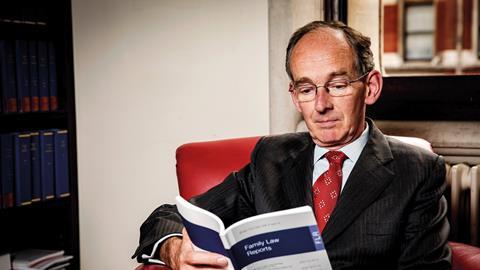Sir Andrew McFarlane’s framework for the family courts concedes that remote hearings will remain predominant for the foreseeable future. Normal business may – or may not – be resumed by the spring
In March, Sir Andrew McFarlane issued guidance for family courts to ‘keep business going safely’ during the pandemic. Three months on, in a new framework covering at least the next six months, the president of the family division says it is time to take off the rose-tinted glasses. ‘It is now clear that, while the situation of total lockdown may be gradually relaxed, the need for stringent social distancing restrictions is likely to remain for many months to come,’ he says in ‘The Road Ahead’.
Before, the question of whether any particular case is heard remotely had to be determined on a case-by-case basis. Now, remote hearings ‘are likely to continue to be the predominant method of hearing for all cases’.
McFarlane says normal family business is unlikely to resume before next spring. So he has mapped out what ‘the road ahead’ will look like.
Many family lawyers will be relieved to hear that they will not be inundated with more guidance. But McFarlane makes one important tweak. A letter to judges on 9 April stated that ‘in all other cases where the parents and/or lay witnesses etc are to be called, the case is unlikely to be suitable for remote hearing’. Now, judges are told that where parents or witnesses are to be called, the case ‘may not be’ suitable for a fully remote hearing.
The entire family court estate should be open to the public by early July, but social distancing will reduce capacity ‘and a good deal of the day-to-day work’ will have to be done remotely.
When it comes to remote meeting platforms, video should be chosen over telephone where possible. Zoom is not supported by the judiciary or HM Courts & Tribunals Service. The Cloud Video Platform, favoured by HMCTS, is being introduced to family court centres. Judges can use Microsoft Teams. Parties should be told at least three days before the hearing what platform is being used.
'Parties will not be allowed to litigate every issue and present extensive oral evidence or oral submissions'
Sir Andrew McFarlane
Family solicitors have described difficulties their clients have faced trying to take part in a remote hearing.
Rachel Benett, an associate solicitor at national firm Stephensons Solicitors, said court hearings are daunting and stressful for parents in care proceedings.
She said: ‘Usually we, their representatives, are physically with them before the hearing to take them through everything, look at papers together and be sure of their instructions, prepare them for the possible outcomes, reassure as much as is possible. They are then either next to us or behind us in court, and we are able to provide ongoing reassurance if necessary. If anything unexpected comes up during the hearing, we can check in with them. With remote hearings we try to do this by phone or video calls before and after the hearing, but it isn’t a perfect substitute for the assistance and reassurance we can give in person.’
Some do not have access to a laptop, smartphone or reliable internet connection, she added.
McFarlane says thought should be given to arranging for a lay party to engage in a remote hearing from a solicitor’s office or barrister’s chambers, or a room in the court building or local authority facility, where they can be supported by at least one member of their legal team and, if appropriate, an interpreter or intermediary.
The hearings should have planned start and finish times, and include regular short breaks. Judges should ensure the party can give instructions to their advocate during the hearing. Judges should regularly ‘check in’ with litigants in person to ensure they are hearing, understanding and following the proceedings.
In December, McFarlane said family lawyers were ‘running flat out up a down escalator’ due to the growing backlog of cases. Covid-19 has made that backlog worse but public law cases must still be completed within the 26-week statutory deadline.
McFarlane says there must now be a ‘very radical reduction’ in the amount of time that courts afford to each hearing. The court must identify the issues and applications that need to be determined. ‘Parties will not be allowed to litigate every issue and present extensive oral evidence or oral submissions,’ the president says. Judges should consider short judgments.
McFarlane acknowledges that the family court faces a ‘daunting’ task ahead. But at a time of continued uncertainty, his pragmatic attitude is no surprise. His framework may be designed for the family court but much of its content could easily apply to other courts trying to find their feet.

































5 Readers' comments